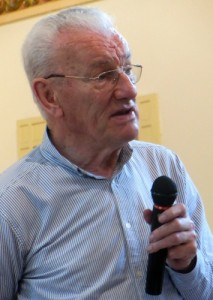 On Saturday 21st Sept 2013 I am attended a Sea of Faith conference in London to be addressed by Stephen Batchelor – on Secular Buddhism and Don Cuppitt on Secular Christianity and Richard Holloway, the former Scottish Episcopal Church Primate. I tried asking them to say in simple terms of about a paragraph to express the Christian or the Buddhist narrative in a secular way. Simplicity I believe is vital if this talk is to go beyond academic discussion.
On Saturday 21st Sept 2013 I am attended a Sea of Faith conference in London to be addressed by Stephen Batchelor – on Secular Buddhism and Don Cuppitt on Secular Christianity and Richard Holloway, the former Scottish Episcopal Church Primate. I tried asking them to say in simple terms of about a paragraph to express the Christian or the Buddhist narrative in a secular way. Simplicity I believe is vital if this talk is to go beyond academic discussion.
I also gave them this sheet which set out the problem – I hope clearly. First a definition of religion (yes mine – but I am not alone. Geertz, Diamond)
A religion is a prescriptive belief system aimed at making sense of life, indicating how to behave and linking people together in a community of shared values. It does this through ceremonies, symbols, rules of behaviour and an underlying basic story or narrative, a narrative that if a religion is to succeed and grow must attract and make sense to the young and to ordinary not so educated or academic people – as well as to the movers and shakers.
The Christian narrative goes something like this. This whole cosmos was created by the only God there is who made man who turned out to be badly flawed. God revealed himself to the Jews and through their prophets to humanity. Finally he sent a unique being – his pre-existing son Jesus, both man and God, to be the Saviour (healer and reconciler) of humanity. He came to live, heal, teach us how to live and face a painful human death through his suffering on the cross, a sacrifice for the good of all. He then came alive again – thus conquering death in a supernatural miracle. This inspired his followers who became bearers of his Spirit. They proceeded to build a community, the Church in which his Spirit lives and which aims to convert and save all humanity from sin and ignorance of God. Helped by grace and faith in Jesus, Christians follow the one (and only) true path which gives all who follow it the promise of supernatural life for ever with God.
The Buddhist narrative goes something like this. The world we live in is but one of several that exist in an infinite and cyclical cosmos. It is not created, it just is. But the world we inhabit is the most important one for us. This is because here alone human beings can achieve a level of enlightenment and awareness not open to other beings. (be they gods, spirits, animals or demons.) Over millennia many human beings having lived millions of lives have reached levels of great wisdom, insight and holiness which have marked them out as exceptional. Finally Sidhattha Gautama was born who was such a person – achieving such enlightenment or awakening as to deserve the title of the Buddha, the one who knows. He has revealed – through his example, teaching and the system of mental and moral training he developed – the noble path to follow if we are to live happy, fulfilled lives free from the need to be reborn. He did this by setting up a community of renunciates supported by householders which conveys this path from generation to generation, a path which may even bring some to achieve a similar level of ultimate transcendence to the one he achieved – Nirvana.
The task If we consider religion to be important for personal well-being and a harmonious society then it seems to me the task for secular Buddhists and secular Christians is to rewrite these two narratives to exclude the supernatural and the fanciful so they do not clash with what we know to be true about the world and our nature as a result of scientific inquiry and systematic, rational thinking. At the same time we seek to discern and remaining true to what we continue to see as being the most valuable elements in each tradition. This is quite a challenge for who and how can we credibly discern what is most valuable? As things stand however it seems to me that the Way of the Buddha with its emphasis on practice and awareness rather than belief and faith requires less modification than any form of Christianity I have yet come across. Perhaps I shall soon be surprised.
As it turns out I was not. Don Cupitt whose book “See of Faith” triggered the Sof F movement, seemed deeply disillusioned about Christianity having ceased to act as a priest or receive communion. His position seemed simply that of a humanist with no expressed desire for any form of religion. Richard Holloway spoke with great passion and insight about meditation and seemed to have come very close to a secular Buddhist position while retaining great affection for Anglican Christianity. Stephen Batchelor who had been in correspondence with me before and we talked together while there, not surprisingly made the most sense to me, suggesting that a recognisable Buddhist path based on a secular, non-supernaturalist world view is a viable option, one which is it seems taking off stimulated by his writing. He is however quick to see this as but the start of a long process involving scholarship, practice and experiment. Here is a link to Secular Buddhists in the UK
See my more detailed response to Stephen Batchelor under Buddha Way.
John Baxter
To read other articles I have written visit www.johnbaxter.org email johnbaxter@nullgetshot.co.uk

